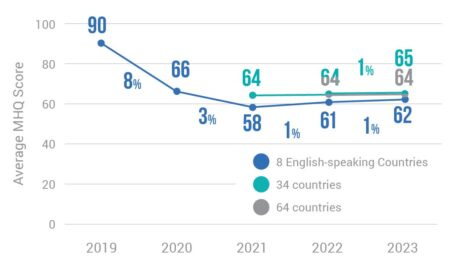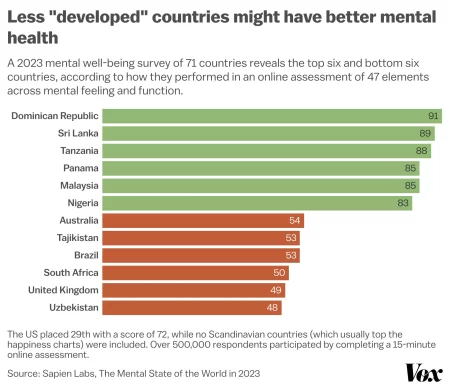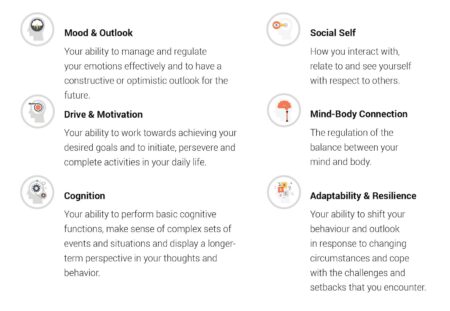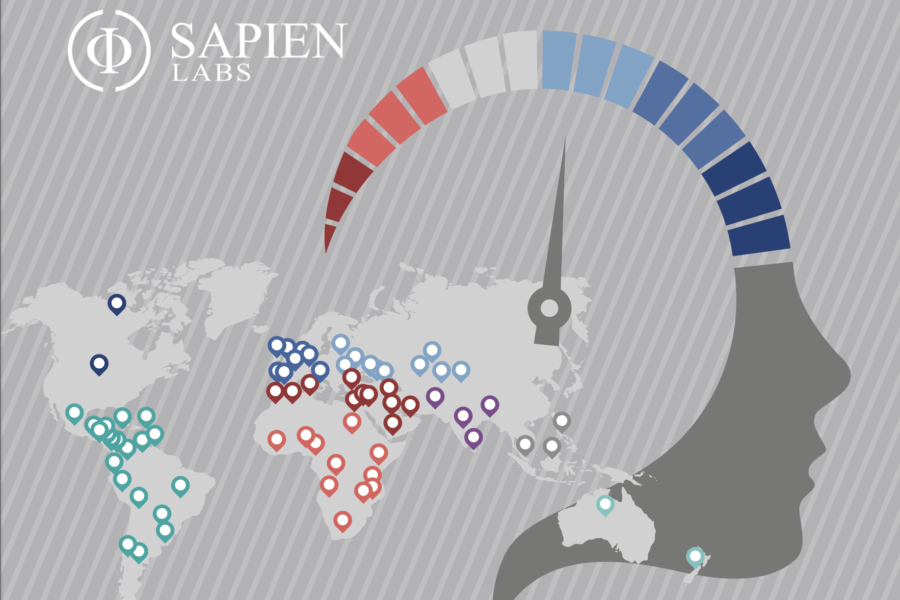The Mental State of the World Report 2023
How do countries around the world fare when it comes to mental health? Where does the United States rank?
This week, the Global Mind Project released The Mental State of the World in 2023, an annual report that provides a view of the evolving mental wellbeing of the global Internet-enabled population.
The results? According to a fascinating, in-depth article at Vox, “The world’s mental health is in rough shape — and not getting any better.”
The 2023 report, based on 419,175 responses from 71 countries in 13 languages, found that “the dramatic decline in mental wellbeing that occurred between 2019 and 2020, and continued into 2021 through the COVID-19 pandemic, continues to persist with no sign of recovery.”
How did this report come about?
It began with a simple question: “What is modernization doing to our brains?” In 2014, using a portable EEG headset to collect brain signals, neuroscientist Tara Thiagarajan decided to conduct research in urban and rural India. According to the Vox article, “they found striking differences in brain activity between their urban brains with lifelong exposure to modernity, and those who’ve spent their lives in small Indian villages.”
Out of this research, the non-profit Sapien Labs was born, which built a survey reaching 49,000 people across eight English-speaking countries, and in 2020 published Sapien’s first Mental State of the World (MSW) report. The report measures what they call the “mental health quotient,” or mental wellbeing score, of survey respondents.
The 2020 results captured the impact of the COVID-19 pandemic, showing that mental wellbeing scores dropped 8 percent worldwide from the year prior. The pandemic’s impact was most striking among young people: 44% of young adults reported clinical level risk of mental health conditions, versus only 6% of those 65 and older.
Findings of The Mental State of the World in 2023
Here’s what the 2023 report shows:
- We have not recovered from the pandemic’s serious blow to global mental health
- Less “developed” countries might have better mental health
- Smartphones, ultra-processed foods, and the breakdown of the family negatively impact modern life
Mental health has not recovered to pre-pandemic levels
According to the 2023 report, “Mental wellbeing remained at its post-pandemic low with yet again no sign of movement towards pre-pandemic levels.”
Of the eight English-speaking countries tracked since 2019, the average MHQ has dropped almost thirty points, remaining relatively constant since its lowest point in 2021.

Economic development/wealth do not lead to greater mental wellbeing
“Greater wealth and economic development does not necessarily lead to greater mental wellbeing, but instead can lead to consumption patterns and a fraying of social bonds that are detrimental to our ability to thrive,” says the report.
Check out this infographic from Vox:

With the Dominican Republic at the top and the United Kingdom near the bottom, the United States places 29th.
How to measure mental wellbeing
There is no one objective way to measure mental wellbeing. Unlike the World Happiness Report (WHR), a publication by Oxford’s Wellbeing Research Centre, this study is not designed to measure subjective feelings of happiness or satisfaction. Instead, it focuses on functioning, using the World Health Organization (WHO) definition of mental wellbeing as “the ability of an individual to handle the normal stresses and adversities of life and contribute productively to society.”
“Mental wellbeing, as we measure it, inherently reflects an individual’s sense of how their inner state impacts their ability to function within their life context.” It takes into consideration factors like the following:

Measuring 47 aspects of mental health, the Global Mind Project assessment produces a “mental health quotient” a number between 0 to 300, ranging from “distressed” to “thriving.”
So how did we fare globally in 2023? Using data from 71 countries, the global average was a mere 65, indicating that we’re all “managing,” just barely above “enduring.”

The culprits: smartphones, ultra-processed foods, and crumbling families
Smartphones
In May 2023, the Global Mind Project released a report on smartphone use that supports the smartphone hypothesis put forward by psychologists like Jean Twenge. In a seminal 2017 article for The Atlantic, “Have Smartphones Destroyed a Generation?” Twenge noted the rapid decline in mental health accompanying the advent of smartphones in kids’ lives.
“The younger you get your smartphone, the worse off you are as an adult,” said Thiagarajan. Of all groups affected by this trend, teen girls are hit the hardest.
Ultra-processed foods
Another factor negatively impacting mental health is the consumption of ultra-processed foods, defined as “food with substances you would rarely find in a home kitchen.” Turns out, eating such food in large amounts “affects everything, every aspect of mental functioning,” said Thiagarajan. People who eat UPFs several times a day have “a threefold increased risk for serious mental health issues.”
Family breakdown
The breakdown of family relationships in the modern world is cited as “a major factor in the decline of youth mental well-being” in another Sapien Labs’ report. “In the aggregate, the risk of mental health challenges in adulthood are four times lower if you have close family relationships.”
Families with “less exposure to the institutions and technologies of modernity, the report argues, tend to have stronger and more numerous family bonds.” In other words, the individualistic, technology-dependent way modern societies are organized is less conducive to mental wellbeing.
Thiagarajan shared the research team’s initial surprise when countries like Venezuela and Tanzania topped the first MHQ table. “But it’s these factors,” she explained. “They can’t afford all the westernized ultra-processed foods so they don’t import them. They don’t give smartphones to their kids so young. And they have large families that stay together.”
The full Vox article is well worth a read. Find it here.
Get the full 2023 country rankings and read The Mental State of the World in 2023 in its entirety.
Or discover your own mental wellbeing score by taking the 15-minute MHQ assessment at Sapien Labs.
Jarrow, Oshan. “The world’s mental health is in rough shape — and not getting any better, a new report finds.” Vox.com, 8 Mar 2024, https://www.vox.com/future-perfect/2024/3/8/24093650/mental-health-report-happiness-growth-well-being-smartphones.
Except for the first infographic from Vox, all images are from Sapien Labs’ The Mental State of the World in 2023.



